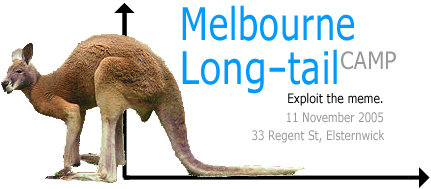Really Simple Memeorandum
I'm no expert on what Bray and Scoble are arguing over, but I can see the parallels. In their discussion, Bray is arguing that the competing formats are very easily made compatible because they are both XML schema using the same syntax, so how hard can it be to standardise the most common tag functions?
Microsoft wants there to be an office-document XML format that covers their billions of legacy documents, and they want it to be open. Fair enough; I approve. But why do we have to re-invent all the basic stuff, and have two ways to express “This paragraph is in 12-point Arial with 1.2em leading and ragged-right justification” or “K37 is the average of B37 through H37”?
My argument echoes this one, though in a different context. What I am saying is that some ranking algorithms, like Google's PageRank or the neural networks behind MSN Search, or even Memeorandum's clustering and ranking algorithms (if Scoble's read is true), are very complex and thus are not suited to being hacked at by amateurs. Just like Office proprietary features. However, it is possible to mimic many of the most important basic functions of these labyrinthine equations to produce something that may be looked down upon by the Google math majors of this world, but will nevertheless create something worthwhile to people, because they can understand it and play with it.
Does that remind you of anything? I'm talking about RSS. Really Simple Syndication is not nearly as complex or feature-rich as its antecedents or competitors, but that has proved to be its greatest strength. Thus the title of this blog entry. What I, and many other people, have been wanting is a Memeorandum/Blogniscient/* where I can open up the hood and start tweaking. That can only happen if the algorithms behind the ranking and/or clustering are opened up to user influence in some way, be that via sliders or forms or attention data or whatever. Most importantly, it can only happen if people can understand what is going on when they are tweaking those knobs. It doesn't have to be as bare-faced as shopping versus research, but that's a start.
Whatever else people say about him, Dave Winer created RSS to purposely dumb down syndication to a level where it was usable by non-geeks, and has succeeded in helping to create a whole new community of people with wildly divergent amounts of technical knowledge. I would like to see a world where we turn our brain inferiority towards Google into a positive by building something that is powerful despite its simplicity, and because of its simplicity. Maybe I'm too stupid to see that concept's stupidity. If it worked for syndicating content, why can't it work for searching content?





